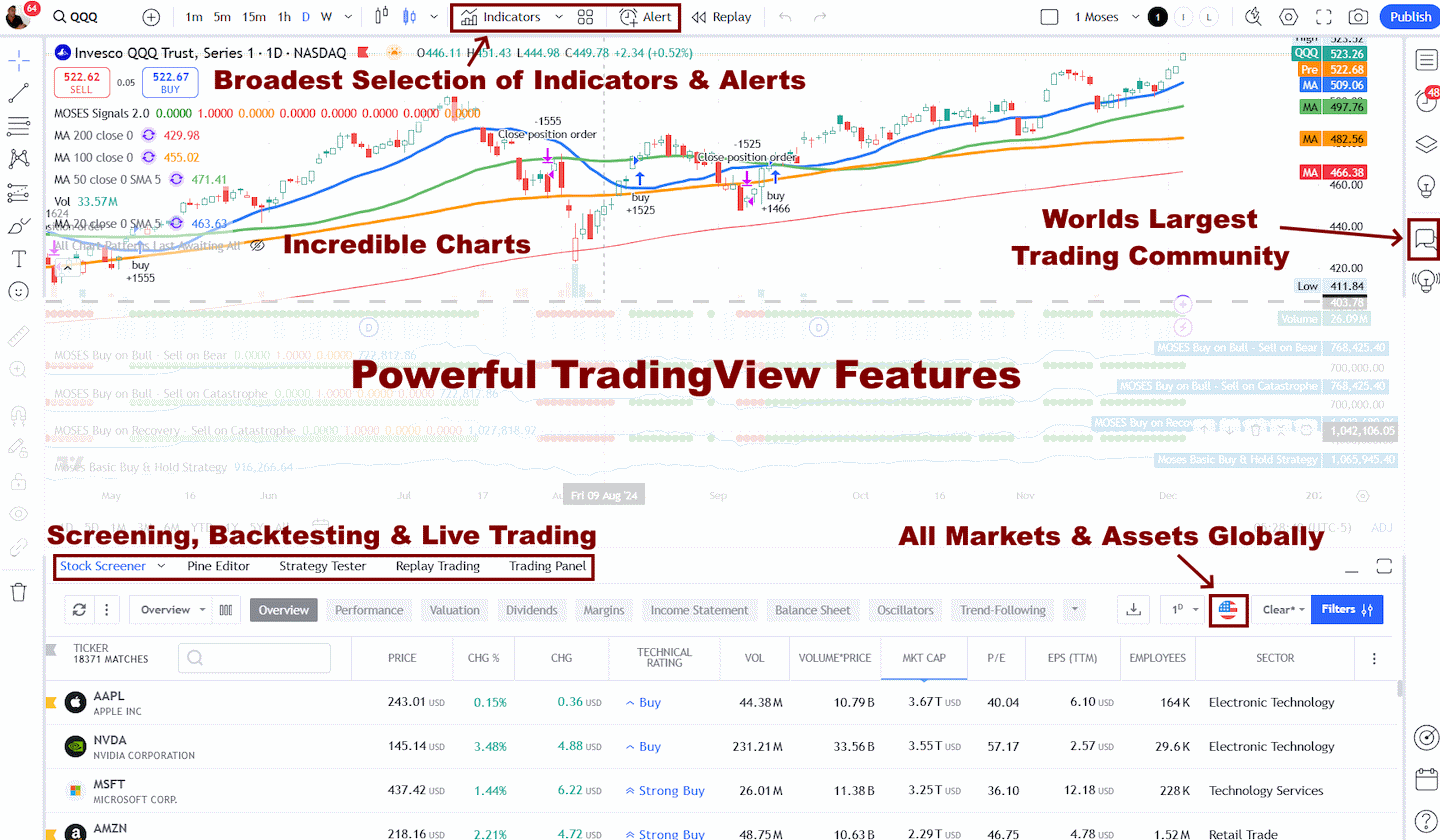Renowned investors are frequently distinguished by their unique approaches. Warren Buffett achieved success by investing in undervalued companies and maintaining long-term positions. George Soros, known for his macroeconomic bets, famously challenged the Bank of England. And Ray Dalio, founder of Bridgewater Associates, has become known for his principles-based approach to investing.

But Jim Simons stood out as the cream of the crop. “There’s only one ultimate GOAT. His name? Jim Simons,” proclaimed Clifford Asness, the co-founder of AQR, a hedge fund, to the Wall Street Journal. The illustrious Medallion fund of Renaissance Technologies, Mr. Simons’s company, raked in a staggering $100 billion in trading profits over the three decades leading to 2018. Its extraordinary 66% average annual return remained unrivaled among all major funds.
My thorough testing awarded TradingView a stellar 4.8 stars!
With powerful stock chart analysis, pattern recognition, screening, backtesting, and a 20+ million user community, it’s a game-changer for traders.

Whether you're trading in the US or internationally, TradingView is my top pick for its unmatched features and ease of use.
Explore TradingView – Your Gateway to Smarter Trading!
Mr. Simons achieved all this as a mathematician at heart rather than an investor. At 23, he left the University of California, Berkeley, with a Ph.D. in the field, subsequently earning the esteemed Oswald Veblen Prize in Geometry.
After working as a codebreaker at the National Security Agency, he was fired for speaking out against the Vietnam War. He later led the mathematics department at Stony Brook University, which quickly became one of the top departments in the country. But it wasn’t until the late 1970s that Mr. Simons decided to apply his expertise in mathematics to the stock market.
As he delved into the world of finance, he realized that many traditional strategies were flawed and often based on outdated assumptions. Coming from a pure math background, Mr. Simons was able to approach investing with a fresh perspective and utilize advanced algorithms and statistical models to identify profitable trades.
His company, Renaissance Technologies, quickly became known for its highly secretive nature and cutting-edge technology. They developed their own proprietary trading system, “Medallion,” which is still considered one of the most successful hedge funds in history.
Mr. Simons founded RenTech in 1978, raiding not only this department but others nationwide. In a rare 2000 interview with Institutional Investor, he stated, “We don’t recruit from Wall Street; we seek those with a strong scientific background.” While this approach is now standard practice in hedge funds, Mr. Simons pioneered it.
Mr. Simons left a significant mark in various aspects. Typically, investors develop theories on asset prices based on real-world financial and economic relationships, rigorously testing their ideas. However, Mr. Simons took a unique approach. Initially, he struggled with a traditional fundamentals-first strategy in his finance career, leading him to delve into vast data pools in search of trading signals, even obscure ones. While he initially emphasized finding explanations before investing, he eventually became open to investing capital without clear rationales. The precise methods he used remain undisclosed; some believe RenTech may have been the pioneering fund in adopting modern machine-learning techniques.
Today, “quant funds” hold a significant portion of Wall Street’s capital, yet only a few rival RenTech’s exceptional returns. The question lingers: Can Mr. Simons’s trading powerhouse sustain its outperformance? Conducting hundreds of thousands of short-term trades daily comes with limitations. Sizeable investments can influence markets, potentially diminishing profitability when scaling up. Consequently, in 2003, the Medallion fund bid farewell to external investors, now exclusively managing funds for employees and alumni. The newer funds crafted for external investors have, to date, failed to meet expectations.
The Medallion fund, despite its modest size, holds significant advantages. In contrast to typical trading firms with competing factions, Medallion, portrayed by Gregory Zuckerman in his biography of RenTech’s founder, Mr. Simons, operates on a unified model with a collaborative team approach reminiscent of academic mathematics departments.
While Medallion lacks external investors, it maintains a traditional fee structure of 5% for management and 44% for performance. This setup facilitates the redistribution of wealth from senior to junior staff members.
Such a framework contributes to the impressive 14-year average tenure at RenTech, surpassing that of many Wall Street counterparts. Moreover, the appeal of being associated with an individual who has attracted brilliance over a lifetime also plays a pivotal role in retaining employees.
This approach allows for a constant influx of fresh and diverse perspectives, as well as continuous learning and development for the team.
RenTech’s collaborative model is further bolstered by its use of sophisticated technology and data analysis. The firm has invested heavily in advanced computer systems and employs top-notch quantitative analysts to analyze vast amounts of financial data in real time.
By utilizing these cutting-edge tools, RenTech is able to identify patterns and trends that are invisible to human traders, giving them an edge in the market.
In addition to its technological prowess, RenTech also implements rigorous risk management processes. Unlike many hedge funds that rely solely on algorithmic trading, RenTech incorporates human oversight into its decision-making process. This allows for a more balanced approach and reduces
Jim Simons, who passed away on May 10th, 2024, at 86, had a more enigmatic strategy, delving into quantitative intricacies in seemingly inexplicable manners.
